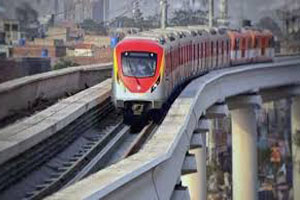
Country’s first major mass transit project opens
The Orange Line Metro Train, the country’ first electricity-run mass transit project, was inaugurated on Sunday – Oct 25. Punjab Chief Minister, Chinese Consul General and Transport Minister jointly inaugurated the project by pressing a button, allowing Punjab Mass Transit Authority (PMTA) to start commercial operation of the train service from Monday. A similar ceremony was simultaneously held in Beijing where top authorities of National Development Reforms Commission, CR-Norinco and Chinese officials concerned inaugurated the project by pressing a button. It was also shown to the audience in Lahore through video link. The project is the first large-scale technologically advanced rail transit project under the Belt and Road Initiative and CPEC. The project was jointly undertaken by China State Railway Group Co. Ltd. and China North Industry Co. Ltd. (CR-NORINCO), with a total track length of 27.1 km and 26 stations, including two underground stations: one at Anarkali and the other at GPO. A depot is located at Dera Gujran which is the northern end of the route and another at Ali Town located at the southern end of the route. The one-way fare is Rs40 and the end-to-end travel time will be 45 minutes. The government expects the use of the facility by about 245,000 passengers on a daily basis. In the past, the civil society held a series of protests, terming the project damaging for a number of heritage sites, including Shalamar Garden. Over 600 trees had to be cut to make way for the route.
|
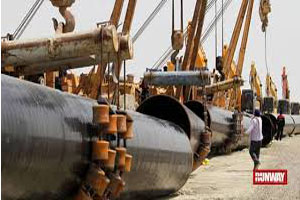
Russia expresses keen interest in NSGPP
Russian President Vladimir Putin has expressed keen interest in the North-South Gas Pipeline Project (NSGPP), which he wants Pakistan to initiate work on as soon as possible. According to sources, the Petroleum Division while reviewing the project status in a recent meeting informed that the Ministry of Foreign Affairs had reiterated the importance of the NSGPP and the Russian president’s personal interest to “initiate work on the project at the earliest”. Pakistan and Russia had signed an agreement in October 2015 to build a gas pipeline from Karachi to Lahore. Pakistan had nominated Inter-State Gas Systems (ISGS) whereas Russia had nominate RT-Global Resources - a part of Russian state corporation Rostec – to build the NSGPP. However, the project hit a snag when the United States slapped sanctions on the Russian firm, RT-Global, in 2016. Since then, the Russian side has changed the structure of the firm six times to avoid sanctions but no success has been achieved so far. Pakistan and Russia signed a protocol in January this year assigning the project implementation rights to North-South Gas Pipeline (Private) Limited – a joint venture between the Eurasian Pipeline Consortium and Federal State Unitary Enterprise (FSUE) Centre of Operations Services of the Russian Ministry of Energy. ETK was part of the consortium to implement the project. Earlier, Special Assistant to Prime Minister told the media that the cost of NSGPP had been increased as its route and diameter of the pipeline has changed. He said that the capacity of gas transmission was also enhanced from one billion cubic feet per day (bcfd) to 1.6 bcfd that would be extendable to two bcfd keeping in view the future need of gas, which could reach up to three bcfd in the next 10 years.
|
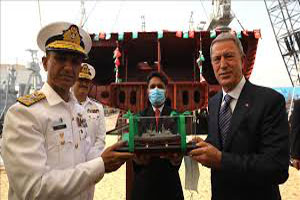
Construction of 3rd Turkish corvette for Pakistan Navy begins
The keel of the third Turkish-built MILGEM corvette for the Pakistan Navy was laid down in a ceremony on 25 Oct - Sunday. The Turkish National Defense Ministry firm ASFAT project will build four vessels for the Pakistan Navy. The keel-laying ceremony was held at a shipyard in Pakistan's economic hub Karachi. The Pakistan Navy signed a contract with ASFAT in July 2018 to acquire four MILGEM-class ships. In October 2019, President Erdoğan, along with Pakistan Navy chief Adm. Zafar Mahmood Abbasi, cut the first metal plate of the first corvette during a ceremony in Istanbul. Turkey is one of the 10 countries that can build, design and maintain warships using domestic capabilities. The MILGEM project was initiated in 2000 to locally design and build a fleet of multipurpose corvettes and frigates that will replace older ships. Following the ceremony, Turkish National Defence Minister, Hulusi Akar and his Pakistani counterpart held a meeting to discuss the possibilities of further cooperation in the defense industry, as well as in bilateral and regional matters.
|

Olive cultivation gains momentum, harvest reaches 11,000 tonnes
The Olive cultivation in the country has been gaining momentum as local output during the current season is projected to cross 11,000 tons, showing a significant development towards reducing reliance on the imported edible oil as well as to exploit the export potential of this particular agriculture produce. “The country is expecting to extract about 13,000 tons of extra virgin olive worth millions of dollars that would help to boost the farm income with less investment and use of inputs,” said Project Director of Olive Cultivation on Commercial Scale in Pakistan. He said that olive has been successfully cultivated over 27,000 hectares of land across the country and it was set to extend its cultivation to over 70,000 hectares to turn the marginal lands into productive for enhancing the income of small scale growers. This initiative would help to bring the semi-barren and marginal lands under cultivation of high-value crop in far off areas of the country, he said adding that besides it would help to eliminate poverty by bringing the most vulnerable communities in safety nets through agriculture interventions. Under the olive cultivation project, he said that farmers were provided about 550,000 plants during last year and this year over 675,000 more plants would be distributed among them to promote its cultivation at large scale.
|
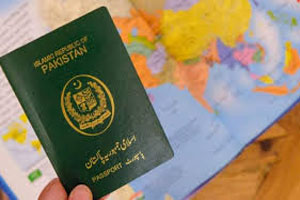
Italy adds Pakistan to ‘Decreto-Flussi' work visa list
In a major development, the Italian government has included Pakistan in work visa category called ‘Decreto-Flussi’, which will allow its nationals to avail seasonal and non-seasonal work visas for the year 2020-21. More than 30,000 work visas would be issued by the Italian authorities to the nationals from a few non-EU countries, including Pakistan, an official statement said. Pakistani workers in agriculture, tourism, construction and freight forwarding sectors can avail this opportunity. Pakistan ambassador to Italy Jauhar Saleem speaking to media said that the country hosts largest Pakistani diaspora in the EU following Brexit, which has sent over $142 million in remittances in 2019-2020. He added that the Pakistan community in Italy had been demanding Pakistan’s re-inclusion in the list of countries eligible for seasonal workers visas, ever since the facility was withdrawn two years ago. The envoy said the demand for Pakistani workers in the Italian market is on the rise consistently, especially in the agricultural sector. It is expected that under the current scheme hundreds of Pakistani workers would obtain gainful employment in Italy. Despite the second wave of ongoing Covid-19 pandemic, which has seen a record number of fresh cases in recent days, the Pakistan embassy has kept its consular section, both in Rome and Milan, fully functional to facilitate the community in benefiting from the growing employment opportunities in Italy.
|
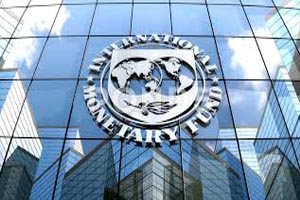
IMF keeps govt on a tight leash
Pakistan has asked the International Monetary Fund (IMF) to relax the conditions for a mini-budget and increase in electricity prices at least till March next year after the ruling party shot down both the proposals due to already high prices. About 10 days ago, the Ministry of Finance had sought the prime minister’s approval for these steps to restore the $6 billion IMF programme that remains suspended since February this year. The IMF is seeking an increase of Rs1.48 per unit in electricity prices, additional taxation measures to achieve Rs4.963 trillion annual tax target and amendments in the State Bank of Pakistan Act of 1956 and Nepra Act. The IMF sees a gap of over Rs300 billion between the tax target and the projected collection, the sources said. The main taxation proposal is to increase the sales tax rates on all items, except medicine and food, to the standard 17%, which will generate a revenue of over Rs300 billion for the Federal Board of Revenue, the sources said. At present, GST rate on many items has been changed to as low as 3%. People were already facing the brunt of double-digit food inflation and constantly increasing cost of living. Pakistan is witnessing a surge in coronavirus cases, which may force the government to curtail business and commercial activities. The likely postponement of these drastic steps could have serious implications for early restoration of the IMF programme, although the government and the fund are showing keenness “to remain engaged”.
|
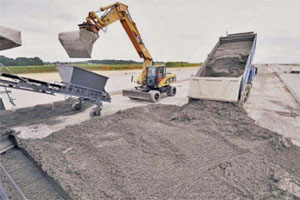
Cement sector depicts robust recovery
The listed cement sector of Pakistan has begun posting exponential growth figures after facing a relatively prolonged slump on account of economic slowdown coupled with the Covid-19 health crisis. Lucky Cement reported consolidated after-tax profit of Rs5.13 billion, up 236% in the first quarter ended September 2020 as opposed to a profit of Rs1.53 billion in the same quarter of previous year. Similarly, Kohat Cement Company’s profit jumped 475% in the first quarter of current fiscal year 2020-21 compared to the same period of last year. The company reported profit of Rs507.1 million against Rs88.2 million in the same quarter of last year. After posting a loss for four consecutive quarters, Maple Leaf Cement reported a profit of Rs555 million last week for the quarter ended September 30, 2020. Pakistan’s cement sales, local and international, registered a growth of 52% quarter-on-quarter, driven by 35% higher volumes and soaring retention prices, the growth came on the back of a jump in total dispatches. The increase in cement revenues came due to higher retail prices in the northern region and higher retention prices because of reduction in federal excise duty.
|

Pakistan earns $ 286m from IT services’ export
Pakistan earned $ 286 million by providing different information technology (IT) services in various countries during the first two months of fiscal year 2020-21. This shows growth of 35.58 per cent when compared to $210.940 million earned through provision of services during the corresponding period of last fiscal year 2019-20, Pakistan Bureau of Statistics (PBS) reported. During the period under review, the computer services grew by 37.27 per cent as it surged from $162.300 million last year to $222.790 million during July-August (2020-21). Among the computer services, the exports of software consultancy services witnessed increase of 16.10 per cent, from $62.468 million to $72.526 million while the export of hardware consultancy services however witnessed decrease of 76.01 per cent, from $0.321 million to $0.077 million. The export of repair and maintenance services also decline by 86.27 per cent from $0.517 million to $0.071 million whereas the export and imports of computer software services witnessed increase of 13.86 per cent, from $49.854 million to $56.762 million. In addition the exports of other computer services rose by 89.98 per cent from $49.140 million to $93.354 million. Meanwhile, the export of information services during the period under review increased by 65.52 per cent by going up from $ 0.290 million to $ 0.480m.
|

Pakistan’s pharma exports surge in first three months of 2020-21
The exports of Pakistan’s pharmaceutical products during the first three months of current fiscal year grew by 22.60 per cent as compared to the exports of the corresponding period of last year. According to the United Nations COMTRADE database on international trade, Pakistan’s exports of pharmaceutical products was $217.04 million last year. During the period from July-September, pharmaceutical products worth $68,176 thousand were exported as compared to the exports of $55,609 thousand of same period of last year. Pakistan is setting up its own medical equipment industry by starting the production of various equipment, said Federal Minister for Science and Technology during a press conference. “We import medical equipment worth $1.6 billion. If we manage to replace that it will be a huge achievement,” said the minister. Items such as disposable syringes, cannulas and vials for blood tests were not manufactured in Pakistan before. Now the Ministry of Science and Technology is setting up factories for this, said Minister for Science and Technology.
|
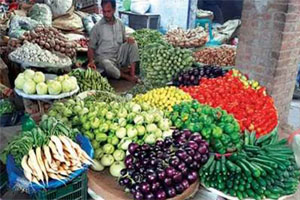
Food imports grow amid wheat, sugar shortages
Increasing wheat imports along with those of tea, palm oil, spices and sugar caused a whopping jump of 56 per cent in the country’s food import bill in the first quarter of 2020-21. It amounted to $1.71 billion in the three-month period. In 2019-20, the food import bill plunged 4.31pc to $5.42bn. In September alone, the food import bill stood at $731 million versus $452m in August and $400m in September 2019, thus signaling the revival in food imports despite the government’s efforts to curb foreign buying through various measures. To control the flour price, wheat imports from Ukraine began in the last week of August with 39,348 tons of the commodity costing $9.5m at the price of $242 per ton. The per-ton rate further dropped to $235 in September as the import quantity swelled to 392,246 tons valuing $92m. The wheat import bill in the first quarter of 2020-21 stood at $102m as 431,594 tons arrived in the country through the private sector.
|
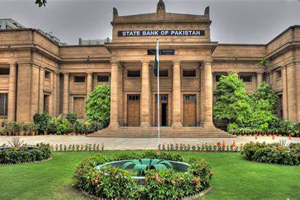
Digitalization of forex regulatory approvals launched
State Bank of Pakistan Governor Dr Reza Baqir on Oct 16 launched a Regulatory Approval System (RAS) for end-to-end digitalisation of foreign exchange-related case submission process. The objective of this initiative was to provide a fully digitalised platform to the business community and individuals in approaching banks for their foreign exchange related requests. The SBP governor believes the initiative will transform FX operations by replacing the paper-based requests with electronic submissions, which is not only efficient but also cost-effective. He highlighted that in order to further liberalise the foreign exchange regime, the central bank has taken several steps. It expanded the delegation of FX related requests to banks. It includes providing ease in payments for acquisition of services from abroad by one-time registration of contract with SBP and remittance of all subsequent payments by the banks, payments directly through the banks for acquisition of services from digital service providers up to $200,000 per year without any approval from the SBP. It also includes registration of foreign currency loans from abroad acquired by the private sector by the banks, and facilitating exporters by allowing them to make shipments on ‘Open Account Basis’ with direct dispatch of documents to the importer while complying with certain conditions related to historical performance on export proceeds realisations.
|
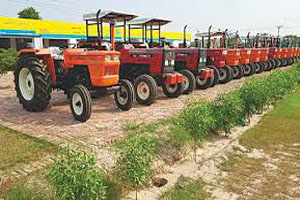
Large-scale manufacturing sputters amid recovery as lockdowns recede
Large-scale manufacturing (LSM) posted a paltry growth of 1.19 per cent from August last year, showed data released by the Pakistan Bureau of Statistics on Friday, but fell by 6.78pc from July. The data shows manufacturing returning to pre-Covid levels, but the recovery is struggling. The big industry output grew by 3.66pc between July and August compared with the same period last year, reflecting a revival in economic activities. In 2019-20, the LSM output fell 10.17pc on a yearly basis. August sees return to pre-Covid levels, but falls from July. Sector-wise, production of 11 items under the Oil Companies Advisory Committee dipped by 5.36pc year-on-year during August, 36 items under the Ministry of Industries and Production went up by 2.33pc, while 65 reported by the provincial bureaus of statistics rose 0.15pc. The LSM constitutes 80pc of the country’s total manufacturing and accounts for nearly 10.7pc of the national output. In comparison, the small-scale industry makes up for just 1.8pc of GDP and 13.7pc of the secondary sector. As per the PBS data, the auto sector with the exception of tractors, trucks and motorcycles was the major laggard with massive declines in sales in August on account of multiple upward price revisions due to currency depreciation.
|

FDI slumps 51pc in September
Foreign direct investment (FDI) into the country fell 50.7 per cent year-on-year in September to $189 million against $383.5m last year, data released by the State Bank of Pakistan (SBP) showed on Friday, 16 Oct. On a cumulative basis, the FDI fell 24pc in the first quarter of the current fiscal year, compared to 40pc increase in the first two months of FY21. The SBP’s data showed the FDI fell to $415.7m during July-September FY21 compared to $545.5m in the same period last fiscal year, witnessing a decline of 23.8pc. The FDI inflows were already poor since the size of inflows is smallest in the region reflecting the extremely low interest of foreign investors in Pakistan. Foreign investment in the first two months of current fiscal year jumped by 40pc compared to same period last fiscal year but remained almost flat compared to July. Down 24pc in first quarter. However, inflows in September were higher than $112.3m received in August. The details showed that investment from China was double than the previous fiscal year. The county received $103.6m during the first quarter of FY21 compared to $55.4m last fiscal year. China has been the biggest investor for last few years.
|
|

© 2020 Alpine Marine Services Private Limited
all rights reserved
|
|
|